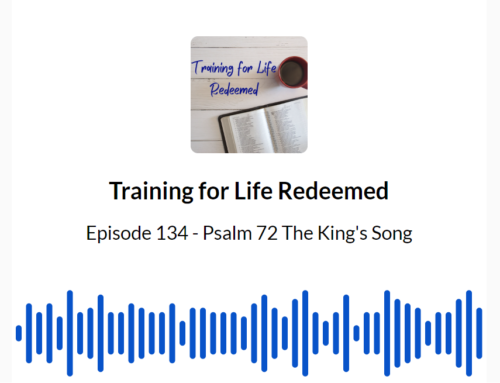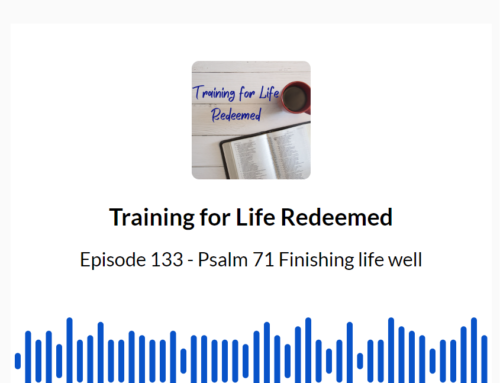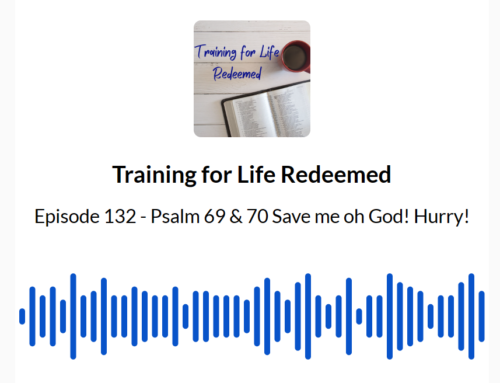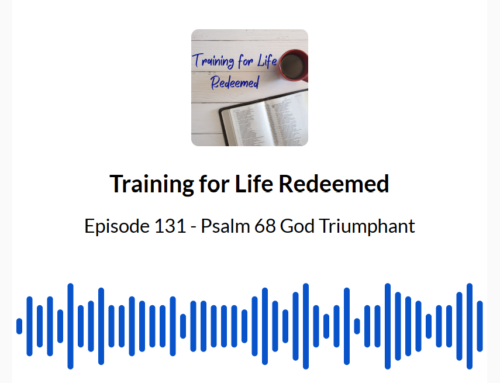God’s King and Saviour is discovered by foreigners who worship another god, relives Israel’s escape from A king who slaughtered little boys, and finds a home in an obscure town, because God’s king came to save the outcasts and the lost.
Grab your notes for this episode by completing the form
and we will send you the link to all our notes.
Transcript
Dan: (00:00)
Hi, everyone. And welcome to training for life redeemed. I am your host, Dan and I am joined by my father, David Jackson. Today. We are continuing to look at the book of Matthew. We are diving into Matthew chapter two and Dad, of course, it flows on from last week. And we’re looking at chapter one at the end of chapter one, Mary was pregnant and Joseph took her in and she had a baby. And then chapter two starts with, you know, after Jesus was born in Bethlehem and Judea and we’ve skipped two years-ish, because now we have wise men visiting and he’s not in a stable when they visit he’s, you know, he’s sitting on a knee running around in Bethlehem. They’re not visiting a baby in a manger, which is not like your lovely Christmas stories with, the shepherds, They get to the manger, but the wise men, they’re following a star and they have at least a few weeks to months travel from where they, were. They see a star, we’ll follow the star, we’ll travel by camel, across Asia and we’ll, we’ll come and find this child.
Dan: (01:10)
They obviously go to Herod because that’s where you would expect a king to be born. And we have a bit of a kerfuffle here that’s gonna happen. And, you know, secrets kept in trying to make sure the babies are kept alive. Cause Herod has a reputation. What, is the importance of this for us?
David: (01:30)
This is almost comedy relief. So a magi is a Zoroastrian priest. So he is part of a, monotheistic religion in Iran. What today is Iran, or Persia and there are still Zoroastrians. Most of them have fled Iran and they’re in India. When I taught this at high school, we actually had a Zoroastrian family, in the school. They were brilliant. but a Zoroastrian priest, these are the people who developed the Zodiac, horoscopes, fortune telling They had a whole, range of these sorts of skills. And as the Jew, as the Greeks went into Persia, they brought back this sort of stuff. There’s a Jewish, magi that turns up, in a Roman governor’s house, being his fortune teller. What’s his name Ronald Reagan’s wife was
David: (02:44)
dedicated to her fortune teller, horoscope reader. So that’s the culture. So the Jews are gonna reject Jesus. On the throne is an Edomite. So the Herods are the descendants of Esau, who wanted to kill Jacob because he stole his birth right. So this is a comedy of errors, right? This is everything Satan could throw at destroying God’s plan. So an Esau person is on the throne. Somebody who worships another god and follows a horoscope they come and worship Jesus and pay tribute to him. And the guy on the throne of Judea wants to kill him. and the safest place for him is Egypt, which is where Moses brought the people out of in the first place. So you’re setting the scene really quickly that Jesus came to die.
Dan: (03:46)
Old Testament connections that are not nice ones all over the place.
David: (03:51)
And, and this big theme that runs through the old Testament of, you know, God, you’ve got you contrast the, the unbelief of God’s people who inherit the scriptures and all the stories and everything else. And it’s the foreign alien god worshipper, who has the better response. And sometimes he rejects his own prophets and goes and uses one of them. So this is, it’s also a foretaste of, all those Old Testament prophecies that said the Kings of the world are gonna bring their wealth, and pay their tribute. So, you know, your Vassal king would bring his taxes once a year and he’d bow down and he’d kiss the King’s foot. And he’d hand him his birthday present, you know, the taxes from the whole country. And that was his pledge of loyalty. And if he didn’t turn up, that was rebellion. So, and God promises in the prophets that Kings of the nations are gonna come and stream into Jerusalem and worship God’s king.
David: (04:55)
Here they are. but Jesus is a toddler. so yeah, they’ve got their own house and they’ve settled. And I think it’s funny, actually, Joseph isn’t home, we don’t tend to, we don’t tend to notice that these guys arrive. They’ve been traveling probably for months. I mean, Persia’s a long way away from Jerusalem and you’ve gotta go north through the Euphrates River and down the coast. Yeah. So they finally arrive in this little village of a few hundred people. and the experts tell us that there’s probably only about 50 kids under two in the village. and they go around and check out where, you know, who’s got a two year old calculating it from their horoscope and when they get there, they see the baby and his mother, no mention of Joseph. Yeah.
Dan: (05:56)
So he’s at work and already either at work or out of the scene Somewhere. Well,
David: (05:57)
I’d say he is probably at work cause they had six more kids.
Dan: (06:01)
That’s true. Actually, I
David: (06:04)
Reckon a while yet. Yeah. He was working hard.
Dan: (06:08)
So Dad, the other thing that happens a lot, I mean, that happens a lot through Matthew generally. but it’s gonna happen quite a few times. Just hearing chapter two is this fulfilling of prophecy the whole way through, and it’s just this brilliant intertwining of just, you know, like you mentioned, the Edomites going to fleeing to Egypt, and all that kind of stuff that’s happening. That’s not even mentioned as fulfilling prophecy, half of that. It’s just, just a pattern, these patterns that you’re just like, oh yeah, we’ve seen that before, already in the story. This is what’s likely to happen. but we also have lots of explicit. This was to fulfil the prophecy. This was to fulfil the prophecies. Yeah. What’s Matthew’s point. I mean, you said he was writing the Jews and that they wanna make sure that he’s the Messiah, but all these prophecies, even about the Messiah are some of them actually about Israel. yeah. I had a lovely lecturer once who talked a lot about Jesus being Israel for Israel, you know?
David: (07:05)
Yeah. So the son of God is Israel is my son my first born. Yeah. Yeah. So he brings his, his first born out of Egypt. Jesus runs away into Egypt. He’s gotta bring him back. You’ve got, you know, Jesus is virtually re walking that old Testament narrative. And when you fulfil something, you’re actually, this was the, you think of the old Testament as a blueprint. So, I mean, you’ve just built a house, nice wall behind you. Uh, but if you go through, you’ve got blueprints for the geological survey, you’ve got blueprints for the foundations, the electricals, the plumbing, the, the framework, um, you’ve got all those different blueprints of the intricacy of what goes into building a building. So what Matthew was doing is pulling the blueprints out, going, okay, there’s the plumbing diagram. Jesus did that. There’s the electrical diagram. Jesus did that. And he’s just pulling them outta the old Testament sheet. After sheet, there was the blueprint. Here’s the reality. and if you don’t have the blueprint, you don’t really appreciate, like I’m looking at a white wall behind you. that doesn’t tell me anything about what went into putting that thing up.
Dan: (08:22)
No, you, you don’t quite get the, uh, three layers on the outside then the, the studs, the electrical work that’s below me. You can’t quite see. Yeah.
David: (08:31)
Yeah. Yeah. So a lot goes into bringing the savior into the world and Jews have been reading, their scriptures are, they’ve got the blue print, but they don’t have no idea. It’s like having a jigsaw without the front picture. So you’re going back and you you’re pulling out the, those pieces that you knew from the old Testament, where do these fit in the big picture?
Dan: (08:53)
Yeah. Okay. So Jesus is kind of following Israel’s history. He’s run away from Esau and instead of going to the brother-in-law, he’s going over to Egypt, he’s going get called out of Egypt. He doesn’t go back to Bethlehem. He goes back to Nazareth. Yeah. And he’s raised in Nazareth, which is, is it’s up north. It’s not near Jerusalem. so he is, uh, I most safer there, I guess in one sense. but also he is, you know, gonna be raised as a bit of a country boy out in the middle of nowhere, cuz he is not even Nazareth isn’t. Like it’s a big town. It’s tiny. Yeah. Even today it’s tiny and it’s a modern in city. It’s tiny. it’s just like Capernaum is gonna be the major city really for him. And it’s just down the road from him. But he’s, you know, probably I’d say roughly half a day’s walk or so. just, just into the Bush really, uh, to where, when Nazareth is, why, why is he there that says it fulfils prophecy? There’s no prophecy that says he’s gonna be called a Nazarene but it says that we’re fulfilling the prophets.
David: (10:02)
Yeah. It’s beautiful. Um, so you got, you gotta sort of know a little bit of the background history, which makes so much sense of this. So you remember Herod slaughters, all the babies in Bethlehem. that’s probably 20 kids. It’s a very tiny village, but Bethlehem’s a two hour walk from Jerusalem. So when the magi go down and they find the baby playing with his mum, Herod’s two hours away waiting to find out which house to go to and the angels tell them you better not go back there. Nick off fellas. And then the angel, the goes to Joseph and Mary and says, get the heck out of there people. And they leave that night. So if you remember the Exodus narrative and how Pharaoh changes his mind in the middle of the night go and Joseph and Mary do do a midnight dash because if by midnight Herod hasn’t heard, he’s just gonna come down, do everybody.
David: (11:01)
And he had a reputation. I mean, he killed his wife, his children just before this. He, just before he died, he killed his son and he, um, when he died, he issued orders that all of his wife’s family were to be slaughtered because they belonged to the dynasty that used to rule Judea. and after he died, his son who did eventually inherit the the Tetraarchy, the quarter area, he went out and slaughtered all the people that slaughtered his, you know, that, that broke into his father’s tomb and smashed the place up. So, I mean, there’s people getting killed, left, right. And center associated with these Herods and the Romans aren’t impressed. so he Nicks and he goes to, the Northern part of the kingdom where he’s out of reach of the guy that’s down here in Jerusalem, hammering away. and he goes to an obscure little village because two kilometres down the road, they’re building a Greek city called Sepphoris
David: (12:11)
And that’s where all the builders are going. This is a huge construction site. So he skedaddles around Judea and ends up up there. He’s got plenty of work. He can set up his new home and it’s where they came from in the first place. So, you know, we’ve gone back to somewhere where the work is, but I, I, I think that last verse in chapter is a screamer. There is no prophecy that says the Messiah will be in Nazarene. Now some preachers will look at that and go, oh, well he was a Nazirite. Well, he wasn’t. Okay. So Nazir is different from Nazer, , and a Nazir doesn’t drink wine. And Jesus did. In fact, you know, a couple of weeks after he started a few days after he started his ministry, he made 700 bottles of wine. so he’s not a, Nazirite a Nazarene, if you remember, when Nathaniel was invited to come and meet Jesus, he made a comment, you know, does anything good come out in Nazareth?
David: (13:21)
Um, I mean, Nathaniel is a real snob, which you can’t really afford to do when you come from Cana, which is just as small and two blocks down the Ridge. It’s sort of, it might be why, because it’s two blocks down the Ridge. It’s like, you know, little town like mine, but we, you know, sort of Liverpool versus Manchester. But the difference is, um, this is an obscure little town way up in the, in the sticks. And the prophets do say that God chooses the insignificant. He chooses the nobodies. And if you go back through the old Testament, you know, he doesn’t take David’s elder brother and the good looking people, he rejects Saul who’s tall and good looking. He goes for the little wimpy runt of the litter, David, and he, he just keeps doing this. So if you look at the pattern in the prophets, Jesus is going to be called a Nazarene, which at the time would be the equivalent of saying, he’s gonna be a Bogan, a hick from the sticks, a Wally, a Cyril, a dero.
David: (14:24)
He’s a nobody. Yeah. and I think that’s beautiful because it challenges, it challenges a lot of church culture, you know, because we tend to think, um, church leadership and church godliness and everything else, we want to be up there with the respectable people. you know, we want, want the Oxford DPhil we want, yeah, yeah. I mean, who doesn’t want an yeah. There a low, I want an Oxford DPhil. What the heck? Uh, but the point is it, the action is where the nobodies are. Um, you know, in, in, in Sydney’s area, you’re talking about Western Sydney, you’re talking about Western new south Wales. Um, you know, this is like saying the prophet said, Jesus come from Broken Hill. It’s wonderful. You know, he’s a Mount Druitt boy. Um, that gives me good news, uh, because that’s where God’s focuses. He’s on the people who are on the fringe, on the edge. And he’s gonna pull the Messiah, outta nowhere, so to speak. even though you’ve had plenty of rewarding about who he is and where he is coming from. so all your respectability, all your pride goes out the window. When you come to deal with this fellow, this is God’s king. And he has come outta nowhere as it were. He’s one of the fringe people. And, and I love that.
Dan: (15:56)
Well, that, that brings us to the end of episode 60, if you are listening, and you would like to grab the study notes to go along with this episode, head over to trainingforliferedeemed.com/60. You can grab the study notes there. If you enjoy the episode, please leave a review for us. And we would love it as well. If you hit the subscribe button and come back and join us next week, as we look at Matthew chapter three,



